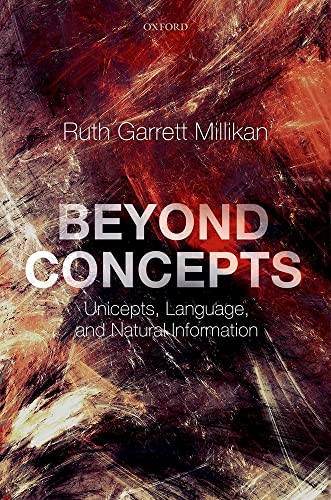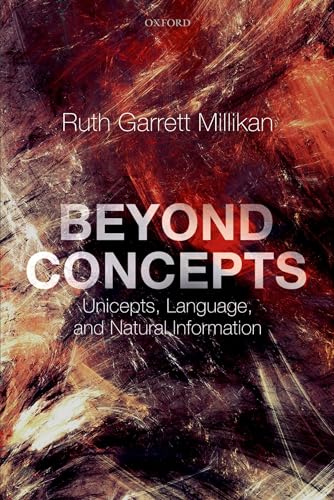beyond concepts unicepts language von millikan ruth (10 Ergebnisse)
FeedbackSuchfilter
Produktart
- Alle Product Types
- Bücher (10)
- Magazine & Zeitschriften (Keine weiteren Ergebnisse entsprechen dieser Verfeinerung)
- Comics (Keine weiteren Ergebnisse entsprechen dieser Verfeinerung)
- Noten (Keine weiteren Ergebnisse entsprechen dieser Verfeinerung)
- Kunst, Grafik & Poster (Keine weiteren Ergebnisse entsprechen dieser Verfeinerung)
- Fotografien (Keine weiteren Ergebnisse entsprechen dieser Verfeinerung)
- Karten (Keine weiteren Ergebnisse entsprechen dieser Verfeinerung)
- Manuskripte & Papierantiquitäten (Keine weiteren Ergebnisse entsprechen dieser Verfeinerung)
Zustand Mehr dazu
- Neu (7)
- Wie Neu, Sehr Gut oder Gut Bis Sehr Gut (1)
- Gut oder Befriedigend (2)
- Ausreichend oder Schlecht (Keine weiteren Ergebnisse entsprechen dieser Verfeinerung)
- Wie beschrieben (Keine weiteren Ergebnisse entsprechen dieser Verfeinerung)
Einband
Weitere Eigenschaften
- Erstausgabe (Keine weiteren Ergebnisse entsprechen dieser Verfeinerung)
- Signiert (Keine weiteren Ergebnisse entsprechen dieser Verfeinerung)
- Schutzumschlag (1)
- Angebotsfoto (3)
Sprache (1)
Preis
- Beliebiger Preis
- Weniger als EUR 20 (Keine weiteren Ergebnisse entsprechen dieser Verfeinerung)
- EUR 20 bis EUR 40
- Mehr als EUR 40
Gratisversand
- Kostenloser Versand nach USA (Keine weiteren Ergebnisse entsprechen dieser Verfeinerung)
Land des Verkäufers
Verkäuferbewertung
-
Beyond Concepts: Unicepts, Language, and Natural Information
Anbieter: WorldofBooks, Goring-By-Sea, WS, Vereinigtes Königreich
EUR 30,91
Währung umrechnenEUR 6,41 für den Versand von Vereinigtes Königreich nach USAAnzahl: 1 verfügbar
In den WarenkorbPaperback. Zustand: Fine.
-
Beyond Concepts: Unicepts, Language, and Natural Information
Anbieter: Ria Christie Collections, Uxbridge, Vereinigtes Königreich
EUR 30,08
Währung umrechnenEUR 13,72 für den Versand von Vereinigtes Königreich nach USAAnzahl: Mehr als 20 verfügbar
In den WarenkorbZustand: New. In.
-
Beyond Concepts: Unicepts, Language, and Natural Information
Anbieter: Mooney's bookstore, Den Helder, Niederlande
EUR 34,08
Währung umrechnenEUR 24,95 für den Versand von Niederlande nach USAAnzahl: 1 verfügbar
In den WarenkorbZustand: Very good.
-
Beyond Concepts: Unicepts, Language, and Natural Information
Anbieter: Kennys Bookstore, Olney, MD, USA
EUR 53,63
Währung umrechnenEUR 8,90 für den Versand innerhalb von/der USAAnzahl: 1 verfügbar
In den WarenkorbZustand: New. 2019. Paperback. . . . . . Books ship from the US and Ireland.
-
EUR 43,00
Währung umrechnenEUR 28,10 für den Versand von Deutschland nach USAAnzahl: 1 verfügbar
In den Warenkorb24 x 16 cm. Zustand: Gut. 3. impression. VIII, 240 Seiten Innen sehr sauberer, sehr guter Zustand. Leineneinband mit Schutzumschlag, mit den üblichen Bibliotheks-Markierungen, Stempeln und Einträgen, innen wie außen, siehe Bilder. Sehr gutes Bibliotheksexemplar. RW-SB-01E|A64 Sprache: Englisch Gewicht in Gramm: 544.
-
Beyond Concepts: Unicepts, Language, and Natural Information
Anbieter: Revaluation Books, Exeter, Vereinigtes Königreich
EUR 44,78
Währung umrechnenEUR 28,63 für den Versand von Vereinigtes Königreich nach USAAnzahl: 1 verfügbar
In den WarenkorbPaperback. Zustand: Brand New. 256 pages. 9.00x6.00x0.50 inches. In Stock.
-
Beyond Concepts: Unicepts, Language, and Natural Information
Anbieter: Revaluation Books, Exeter, Vereinigtes Königreich
EUR 54,66
Währung umrechnenEUR 28,63 für den Versand von Vereinigtes Königreich nach USAAnzahl: 2 verfügbar
In den WarenkorbPaperback. Zustand: Brand New. 256 pages. 9.00x6.00x0.50 inches. In Stock.
-
Beyond Concepts : Unicepts, Language, and Natural Information
Verlag: Oxford University Press Dez 2019, 2019
ISBN 10: 0198717202 ISBN 13: 9780198717201
Sprache: Englisch
Anbieter: AHA-BUCH GmbH, Einbeck, Deutschland
EUR 42,61
Währung umrechnenEUR 61,96 für den Versand von Deutschland nach USAAnzahl: 1 verfügbar
In den WarenkorbTaschenbuch. Zustand: Neu. Neuware - Ruth Garrett Millikan presents a strikingly original account of how we get to grips with the world in thought. Her question is Kant's 'How is knowledge possible ', answered from a contemporary naturalist standpoint. We begin with an understanding of what the world is like prior to cognition, then develop a theory of cognition within that world.
-
Beyond Concepts: Unicepts, Language, and Natural Information
Anbieter: Revaluation Books, Exeter, Vereinigtes Königreich
EUR 84,42
Währung umrechnenEUR 28,63 für den Versand von Vereinigtes Königreich nach USAAnzahl: 1 verfügbar
In den WarenkorbHardcover. Zustand: Brand New. 240 pages. 9.25x6.25x0.75 inches. In Stock.
-
Beyond Concepts : Unicepts, Language, and Natural Information
Verlag: Oxford University Press, OUP Oxford Okt 2017, 2017
ISBN 10: 0198717199 ISBN 13: 9780198717195
Sprache: Englisch
Anbieter: AHA-BUCH GmbH, Einbeck, Deutschland
EUR 81,27
Währung umrechnenEUR 62,73 für den Versand von Deutschland nach USAAnzahl: 2 verfügbar
In den WarenkorbBuch. Zustand: Neu. Neuware - Ruth Garrett Millikan presents a highly original account of cognition - of how we get to grips with the world in thought. The question at the heart of her book is Kant's 'How is knowledge possible ', but answered from a contemporary naturalist standpoint. The starting assumption is that we are evolved creatures that use cognition as a guide in dealing with the natural world, and that the natural world is roughly as natural science has tried to describe it. Very unlike Kant, then, we must begin with ontology, with a rough understanding of what the world is like prior to cognition, only later developing theories about the nature of cognition within that world and how it manages to reflect the rest of nature. And in trying to get from ontology to cognition we must traverse another non-Kantian domain: questions about the transmission of information both through natural signs and through purposeful signs including, especially, language. Millikan makes a number of innovations. Central to the book is her introduction of the ideas of unitrackers and unicepts, whose job is to recognize the same again as manifested through the jargon of experience. She offers a direct reference theory for common nouns and other extensional terms; a naturalist sketch of conceptual development; a theory of natural information and of language function that shows how properly functioning language carries natural information; a novel description of the semantics/pragmatics distinction; a discussion of perception as translation from natural informational signs; new descriptions of indexicals, demonstratives and intensional contexts; and a new analysis of the reference of incomplete descriptions.






